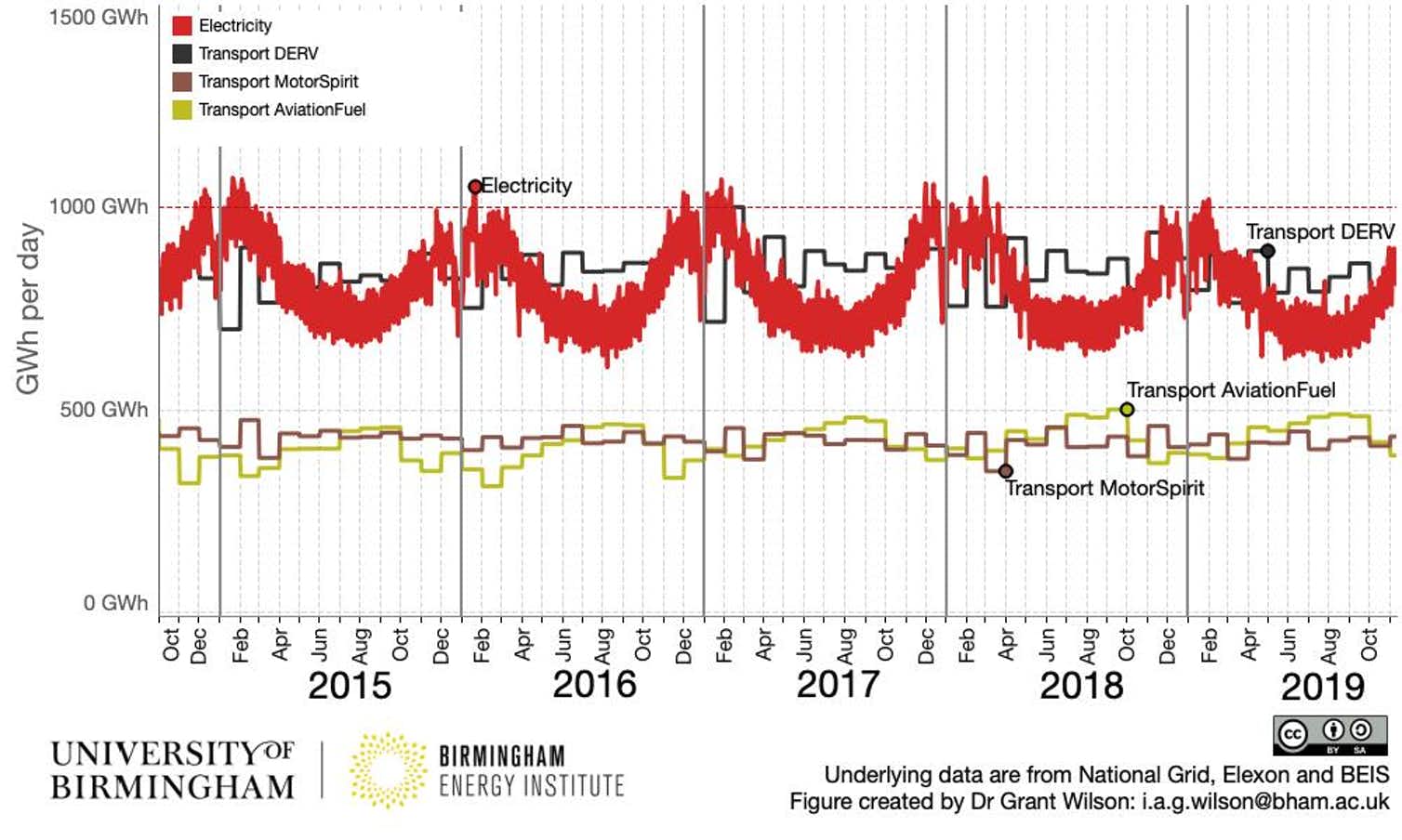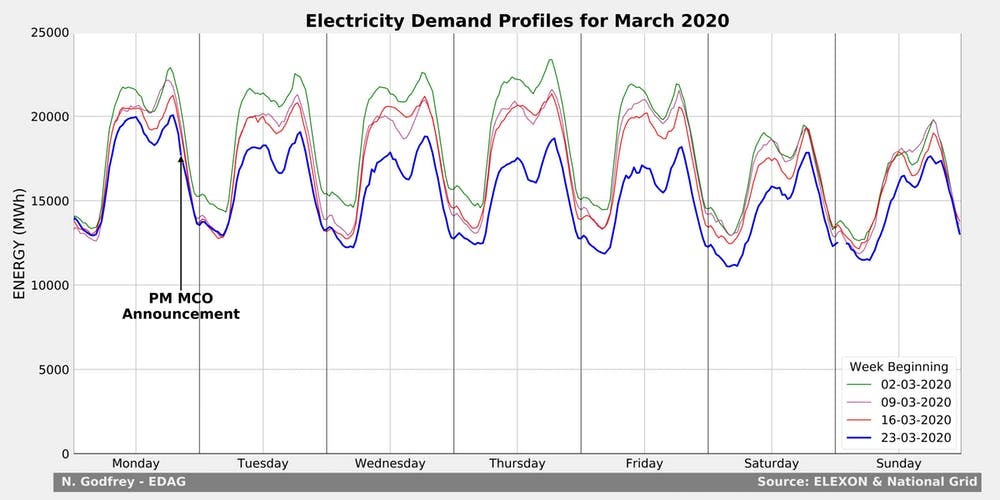Electricity usage suggests we’re living every day like a perpetual weekend
As people retreat to their homes, a group of analysts have seen a significant decrease in fuel consumption in the UK’s largest sectors as transport reduces and offices and businesses close

Your support helps us to tell the story
From reproductive rights to climate change to Big Tech, The Independent is on the ground when the story is developing. Whether it's investigating the financials of Elon Musk's pro-Trump PAC or producing our latest documentary, 'The A Word', which shines a light on the American women fighting for reproductive rights, we know how important it is to parse out the facts from the messaging.
At such a critical moment in US history, we need reporters on the ground. Your donation allows us to keep sending journalists to speak to both sides of the story.
The Independent is trusted by Americans across the entire political spectrum. And unlike many other quality news outlets, we choose not to lock Americans out of our reporting and analysis with paywalls. We believe quality journalism should be available to everyone, paid for by those who can afford it.
Your support makes all the difference.The measures to control the spread of Covid-19 are unparalleled, and this is already having an effect on Britain’s energy system. There have been massive short-term changes in the past: for instance the temporary imposition of a three-day week in the 1970s may have had an even greater overall effect, but this was due to industrial action in the coal sector affecting the supply of energy. This time, the disruption is on the demand side – the energy is still available, but the demand for it has reduced.
We are a group of academics monitoring the situation to understand how national energy demand is affected by changes in day-to-day routines. We should point out that the energy system is very resilient, and there are well developed contingency plans to keep the energy flowing. But the response to coronavirus is affecting things in various other ways:
Demand for petrol, diesel and aviation fuel is plummeting
We already know that there has been an enormous reduction in flights, public transport and road traffic, and April is expected to record the lowest monthly liquid fuels demand since data started in 1998.

A greater than 40 per cent reduction is possible if Britain restricts the movement of people more than it currently has, an incredible short-term drop in demand. However, since the government publishes liquid fuels data two months in arrears, the full extent of the reduction in demand will not become clear until the summer.
Weekdays look like weekends
With most shops, factories and offices closed or under severe restrictions, we expect the electrical demand of a normal working day to continue to be closer to that of a weekend or bank holiday. Typically there is a 10-20 per cent drop between a weekday and a weekend day, depending on the time of year.

The chart above shows that prime minister Boris Johnson’s lockdown announcement (on Monday 23 March) caused an immediate 5-10 per cent reduction in electrical demand.
The last time demand was this low for the month of March was back in 1975, a further indication of how the coronavirus measures are changing people’s routines, and the energy they use to underpin these. April is likely to be lower still, taking Britain’s electrical demand back to the 1960s, to a period before daily data became available.
With many people working from home and schools shut, people are less governed by routines and strict adherence to times for commuting or the school run. This has caused the typical morning electricity “peak” to flatten out, as electrical showers, kettles, lights and heating are spread over a slightly longer period. Something similar happens on Sunday mornings and, in particular, on Christmas Day and New Year’s Day.
We are also keen to observe how much increased digital traffic will increase the load on the electrical system. As most face-to-face meetings have now effectively stopped, various conversations, meetings and indeed lessons are now taking place online or over the phone. Domestic wifi use is skyrocketing as people stay in and internet service providers remove limits on broadband data, causing an unprecedented strain on data centres across the world.
Declining carbon emissions
An overall drop in energy demand should mean a proportionate decrease in emissions, particularly as people use a lot less petrol, diesel and aviation fuel. The reduction in plane and car travel is expected to significantly lower carbon emissions in April, even when considering the increase in online delivery services for food and other necessities.
Less electrical demand also means coal and some gas power plants can be turned down or switched off, and a greater proportion of demand can be met with low-carbon generation. Therefore we expect a decrease in grid carbon intensity (a measure of how much carbon goes into producing a unit of energy). However, this is dependent on the weather – if there’s no wind or sun, fossil fuel generation is needed to meet demand.
It is clear that measures to control the spread of the coronavirus are already having significant effects on Britian’s energy systems. But we don’t yet know how long these measures will last, and how quickly demand will bounce back to levels prior to Covid-19. It may even be that overall energy demand will rebound back even further to take advantage of cheaper fossil fuels, thus bucking the trend of extraordinary reductions in energy use and carbon intensity over the past decade.
Additional reporting by Noah Godfrey, Shivangi Sharma and Tom Bassett
Grant Wilson is a lecturer, part of Energy Data Analytics Group in chemical engineering at the University of Birmingham; Noah Godfrey is an energy data analyst with a PhD in modelling flexibility in future UK energy systems at the University of Birmingham; Shivangi Sharma is an ERDF knowledge exchange fellow at the University of Birmingham; Tom Bassett is a senior engineer in active building centre at the Swansea University.
© Washington Post
Join our commenting forum
Join thought-provoking conversations, follow other Independent readers and see their replies
Comments